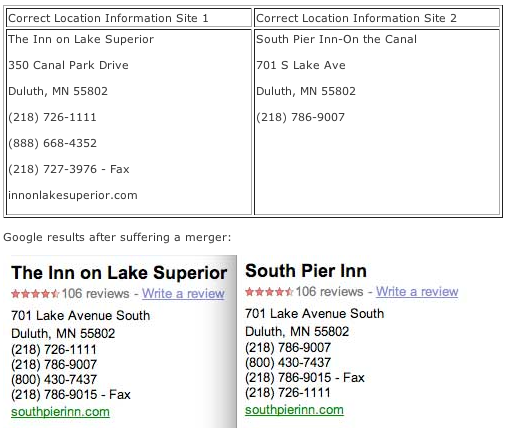Is It Time To Send Google Maps Back To The Drawing Board?
Google Maps and its Local Business Center continue to be the ugly warts on Google’s otherwise smooth surface. But rather than the long-running problems with mapspam and hijacked listings, the latest sore spot appears to be an internal problem with Google’s apparently unsophisticated (or perhaps over-complicated?) database systems. Mike Blumenthal points out today that Google […]
Google Maps and its Local Business Center continue to be the ugly warts on Google’s otherwise smooth surface. But rather than the long-running problems with mapspam and hijacked listings, the latest sore spot appears to be an internal problem with Google’s apparently unsophisticated (or perhaps over-complicated?) database systems.
Mike Blumenthal points out today that Google is merging the listings of businesses who happen to have similar addresses or phone numbers. Here’s one example Mike shares:

(Note that Yahoo has no trouble recognizing Duluth inns that have similar addresses.)
Mike explains Google’s situation like this:
“Despite having the Local business Center to provide authoritative information to a business listing, Google for a number of reasons and in a number of situations has always merged some business records inappropriately. The merged records will take on parts of one record and parts of the other in a somewhat willy nilly fashion, the url of one business and the telephone number of the other for example.”
On the Google Maps Help Forum, Google employee Joel says this in response to a business person’s request for help: (emphasis below is mine)
“This is how our system works by design. Businesses that are the same address / location are merged. In general, it’s the right thing to do.”
It’s not the right thing to do. It’s dangerous and irresponsible to systematically merge business listings. There are thousands of businesses who share similar addresses inside a single office building. A single real estate office might have anywhere from 10 to 100 agents at the same address — each agent is a separate business owner, and each one deserves his/her own listing in Google Maps. A single medical building might have 5-10 different doctors, each one also deserving of a separate listing in Google Maps.
And in fact, as Mike points out in his post, Google’s merging of medical listings for two doctors almost cost a patient his life over the weekend. “Ellen,” who apparently works in one of the affected offices, explained the situation on the Maps Help Forum:
“Google merged the records for Dr John G Moe and Dr Kenneth Landis and this almost led to a tragic patient outcome this weekend. An emergency room doctor from Kansas tried to contact Dr. Moe to see if a certain drug could be given to our patient. Since the patient was unable to give the ER our phone number, the googled Dr John G Moe. Since Google linked our record, the saw the phone number for Dr Landis and left a message on his answering machine and since he wasn’t on call that weekend, we didn’t learn of the problem until much later.”
Whether it’s spam, hijacked listings, or in this case, problems with Google’s systems, mistakes with local business information on Google can sometimes be a matter of life and death. The irony, or the hypocrisy as I’ve written on my own blog, is that Google will cite the need for accurate medical information on the web when explaining why paid links are bad, yet it merges medical information in Google Maps when doctors share an office building, or leaves them open to community editing as part of Google’s “wiki nature” approach to local business listings.
Google Maps is one of the company’s fastest-rising properties, and in theory it offers a great way for local businesses to be found by searchers, even if the business doesn’t have a web site. But it has been beset by problems for years now, and remains vulnerable to abuse and internal problems (as described above).
At this point, it makes you wonder, is it time to send Google Maps and the Local Business Center back to the drawing board?
Contributing authors are invited to create content for Search Engine Land and are chosen for their expertise and contribution to the search community. Our contributors work under the oversight of the editorial staff and contributions are checked for quality and relevance to our readers. The opinions they express are their own.
Related stories